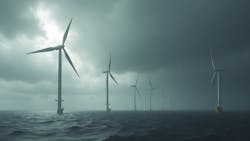Equinor takes a $955-million writedown, largely on US offshore wind
Equinor has booked a $955-million impairment on an offshore wind project in the United States, citing US tariffs and the uncertainty of the US regulatory environment under President Donald Trump.
On Trump’s first day back in office in January, he suspended offshore wind leases. Then in April, Interior Secretary Doug Burgum shut down Equinor’s Empire Wind development offshore New York. That stop-work order was later lifted.
For Equinor, however, the damage was done, according to analysis set forth in a recent Reuters report. On July 23, the company reported that its net operating income for the second quarter fell due to having to book a near-billion dollar impairment on its US offshore wind projects.
As reported by Reuters, Equinor CFO Torgrim Reitan said that a combination of tariffs, the shifting regulatory environment in US offshore wind, and the removal of tax credits had affected the value of the company’s onshore terminal in South Brooklyn, which had been designed to serve multiple offshore wind farm installations.
“[The impairment] is driven by regulatory changes in the US, particularly related to [the] investment tax credits [that] have been taken away for new developments,” Reitan told Reuters.
“You also have tariffs, and there’s also a presidential order stopping permitting of new offshore wind projects.”
“It is those new offshore wind projects that drive the impairment, because we have a terminal, the South Brooklyn Marine terminal, where we had assumed two more developments than our own Empire Wind to pay for that. That is now unlikely.”
Out of the $955-million impairment, some $763 million is related to Empire Wind 1 and its South Brooklyn Marine Terminal project, with the remainder related to the lease of the Empire Wind 2 farm, the company said.
Equinor had won a federal lease for Empire Wind in 2017 under Trump’s first administration and secured approval for its investment plans in 2023 during the Biden administration.
Tariffs, including on steel, had increased costs on the project by $300 million, Reitan said. Equinor would still receive tax credits for the first phase of Empire Wind, but not for the second one.
“Without investment tax credits and without a government that wants it to happen, we are not going to invest in it,” said Reitan.
